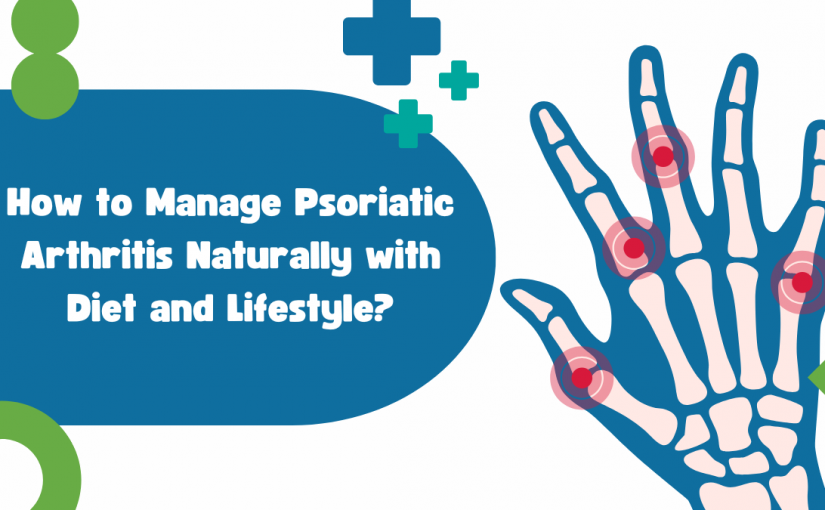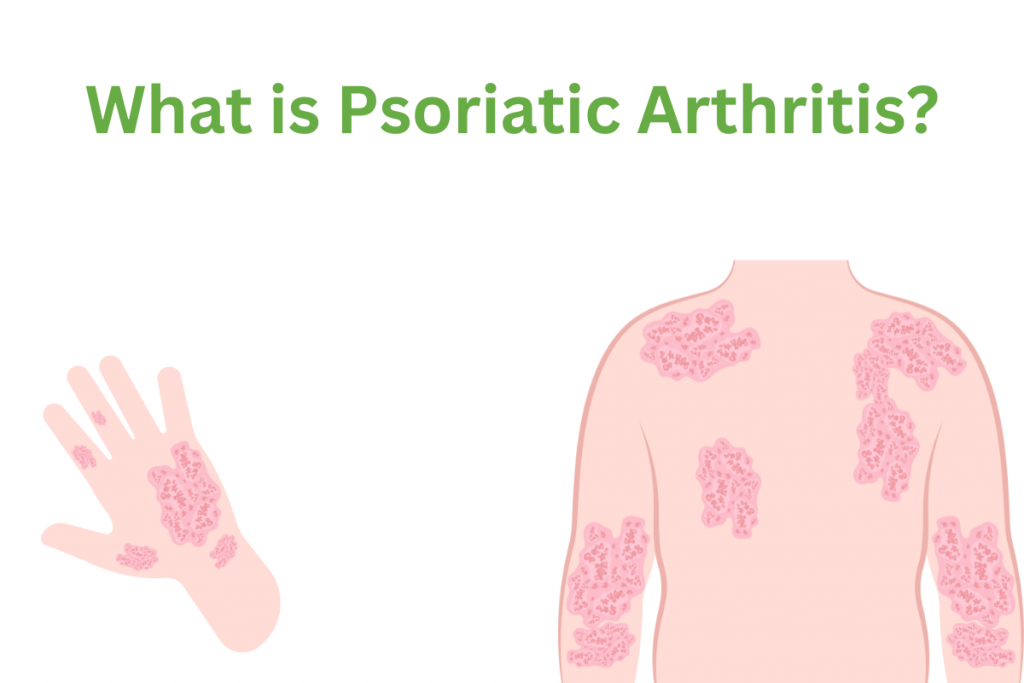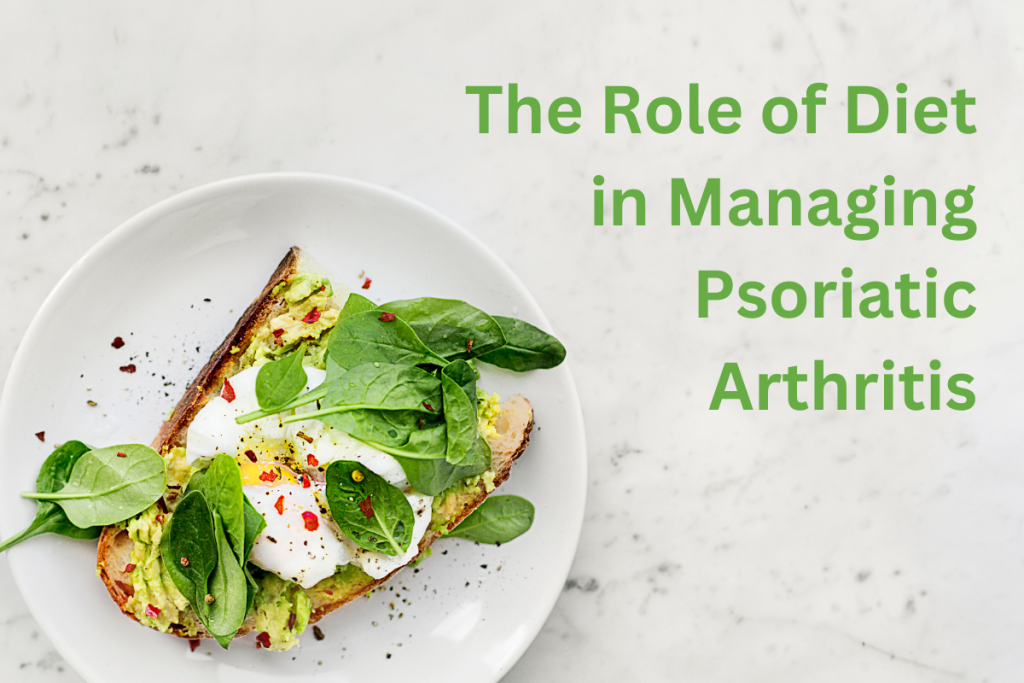How to Manage Psoriatic Arthritis Naturally with Diet and Lifestyle?
Before understanding the triggers and diving in deep, let’s know What is Psoriatic Arthritis.
Psoriatic arthritis is a form of arthritis that commonly affects individuals with psoriasis. However, in some cases, PsA can develop before skin symptoms appear.
The immune system plays a central role in PsA, mistakenly attacking healthy cells in the skin and joints, leading to inflammation.
PsA results from an overactive immune system, causing inflammation that damages the skin and joints. Several factors, such as stress, poor dietary choices, lack of physical activity, and obesity, can trigger or worsen symptoms.
By addressing these triggers with targeted natural strategies, you can reduce the frequency and severity of flare-ups.
The Triggers:
- The Role of Diet in Managing Psoriatic Arthritis:
- Stress Management and Its Impact on Flare-Ups:
- The Connection between Gut Health and Psoriatic Arthritis:
- Diet’s Role in Gut and PsA Health
- Impact of Gut Health on Treatment Efficacy
- Supplements for Psoriatic Arthritis
- Building a Psoriatic Arthritis-Friendly Lifestyle:
While PsA’s exact cause remains unknown, certain triggers can provoke or worsen symptoms. These include:
- Stress:
Emotional or physical stress can exacerbate autoimmune responses. High cortisol levels can increase inflammation, intensifying PsA symptoms. - Infections:
Bacterial or viral infections, such as strep throat, can activate the immune system, leading to a PsA flare-up. - Skin Injuries (Koebner Phenomenon):
Cuts, scrapes, or even tattoos can trigger psoriasis lesions, which might subsequently influence joint inflammation in PsA - Medications:
Certain drugs, such as lithium or beta-blockers, are known to aggravate psoriasis and PsA - Lifestyle Factors:
- Obesity: increases mechanical stress on joints and promotes inflammation.
- Smoking and Alcohol: Worsen inflammation and reduce treatment efficacy.
- Environmental Factors:
Climate and weather changes, such as icy and dry conditions, can worsen symptoms. - Hormonal Changes: Fluctuations during pregnancy, menopause, or other hormonal shifts may trigger flareups.
The Role of Diet in Managing Psoriatic Arthritis:
Psoriatic arthritis (PsA) is a chronic autoimmune disease that affects the skin and joints, leading to inflammation, pain, and discomfort.
While medical treatments like biologics and anti-inflammatory drugs are essential for controlling the disease, diet significantly supports symptoms and improves overall health.
A well-planned diet can help reduce inflammation, improve energy levels, and enhance the efficacy of medical treatments.
Dietary Strategies:
1. Embrace an Anti-Inflammatory Diet
Anti-inflammatory diets focus on whole, nutrient-dense foods and limit those that promote inflammation. Popular examples include the Mediterranean diet and DASH (Dietary Approaches to Stop Hypertension) diet.
2. Focus on Omega-3 Fatty Acids
Omega-3s are known for their inflammation-reducing properties, which can help alleviate joint pain and swelling in PsA.
3. Limit Pro-Inflammatory Foods
Certain foods can trigger or worsen inflammation, potentially leading to flare-ups. Found in white bread, pastries, and sugary drinks, these foods spike blood sugar levels, promoting inflammation.
High levels of saturated fats and inflammatory compounds can exacerbate symptoms.
4. Maintain a Healthy Weight
Excess weight puts additional stress on joints and exacerbates inflammation, making weight management critical for PsA patients. Losing even a small percentage of body weight can significantly improve joint pain and mobility.
5. Monitor Food Sensitivities
Some individuals with PsA may have specific food sensitivities that worsen symptoms. Common culprits include gluten, nightshade vegetables (like tomatoes and peppers), and dairy.
Stress Management and Its Impact on Flare-Ups:
Living with psoriatic arthritis (PsA) can be challenging, and stress often exacerbates its symptoms. As a chronic autoimmune condition, PsA is characterized by joint pain, swelling, and skin plaques, all of which can flare up under heightened stress.
Understanding the connection between stress and PsA flare-ups and learning effective stress management strategies can significantly improve the quality of life for those affected.
The Science Behind Stress and Flare-Ups
Research supports the link between stress and PsA flare-ups. Chronic stress has been shown to:
- Worsen psoriasis plaques, increasing skin inflammation.
- Amplify joint pain and stiffness through elevated inflammatory markers like TNF-alpha and interleukins.
- Prolong recovery times from flares, as stress inhibits the body’s natural healing mechanisms.
Effective Stress Management Techniques
1. Mindfulness and Meditation
2. Regular Exercise
3. Deep Breathing Exercises
4. Adequate Sleep
5. Cognitive Behavioral Therapy (CBT)
6. Journaling
7. Engage in Hobbies
8. Social Connections
The Connection between Gut Health and Psoriatic Arthritis:
Psoriatic arthritis (PsA) is a chronic inflammatory disease that affects the joints and skin. While much focus has traditionally been on immune system dysfunction, emerging research highlights the gut microbiome’s crucial role in inflammation and autoimmune conditions like PsA.
Understanding the connection between gut health and PsA can provide new avenues for managing this challenging condition.
Evidence Linking Gut Health to Psoriatic Arthritis
Research continues to uncover compelling connections between gut health and PsA:
- Gut Dysbiosis in PsA Patients:
Studies have shown that individuals with PsA often exhibit a less diverse gut microbiome compared to healthy individuals. Reduced microbial diversity is associated with heightened inflammation. - Overlap with Other Conditions:
PsA patients are more likely to have comorbidities like inflammatory bowel disease (IBD), suggesting shared gut-related mechanisms. - Effect of Probiotics and Prebiotics:
Emerging evidence indicates that restoring gut balance with probiotics and prebiotics may help reduce inflammation in PsA.
Diet’s Role in Gut and PsA Health
Diet significantly impacts the gut microbiome, influencing PsA symptoms. A gut-friendly, anti-inflammatory diet can promote microbial diversity and reduce systemic inflammation.
1. Foods That Improve Gut Health
- Fermented Foods: Yogurt, kefir, sauerkraut, kimchi, and miso introduce beneficial probiotics.
- Fiber-Rich Foods: Fruits, vegetables, whole grains, and legumes feed good gut bacteria.
- Omega-3 Fatty Acids: Found in fatty fish, flaxseeds, and walnuts, omega-3s have anti-inflammatory effects.
2. Foods to Avoid
- Processed Foods: High in additives and sugars, which disrupt gut bacteria.
- Red Meat and Saturated Fats: Promote harmful bacteria and inflammation.
- Alcohol and Artificial Sweeteners: Can damage the gut lining and contribute to dysbiosis.
Impact of Gut Health on Treatment Efficacy
Gut health may also influence how well PsA treatments, particularly biologics, work. Dysbiosis can impair the body’s response to these medications.
By improving gut health, patients may experience better treatment outcomes.
Natural Remedies and Supplements:
Top Natural Remedies for PsA
1. Turmeric
- Why It Works: It Contains curcumin, a compound with powerful anti-inflammatory and antioxidant properties.
- How to Use:
- Add turmeric to meals or smoothies.
- Take curcumin supplements (500–1,000 mg daily) with black pepper for better absorption.
2. Ginger
- Why It Works: It contains gingerol, which reduces inflammation and alleviates pain.
- How to Use:
- Drink ginger tea or add fresh ginger to meals.
- Take ginger supplements (250–500 mg twice daily).
3. Omega-3 Fatty Acids
- Why It Works: Found in fatty fish like salmon, mackerel, and sardines, omega-3s have potent anti-inflammatory effects and may reduce joint pain and stiffness.
- How to Use:
- Consume fatty fish 2–3 times per week.
- Take fish oil supplements (1–3 grams of EPA and DHA combined daily).
4. Aloe Vera
- Why It Works: Has anti-inflammatory properties that can soothe psoriatic skin and reduce joint discomfort.
- How to Use:
- Apply aloe vera gel to affected skin areas.
- Drink aloe vera juice in moderation to support overall inflammation reduction.
5. Capsaicin Cream
- Why It Works: Derived from chili peppers, capsaicin can block pain signals and reduce localized inflammation when applied to the skin.
- How to Use: Apply to painful joints as directed, avoiding broken skin.
6. Epsom Salt Baths
- Why It Works: Magnesium in Epsom salts can relax muscles, reduce joint swelling, and ease psoriasis-related skin irritation.
- How to Use: Dissolve 1-2 cups of Epsom salts in a warm bath and soak for 15–20 minutes.
7. Willow Bark
- Why It Works: Salicin, a natural compound similar to aspirin, helps reduce pain and inflammation.
- How to Use: Take it as tea or in supplement form (consult a healthcare provider for dosage).
8. Boswellia (Indian Frankincense)
- Why It Works: Contains compounds that inhibit inflammatory enzymes, potentially reducing joint pain and swelling.
- How to Use: Take Boswellia serrata supplements (300–500 mg two to three times daily).
Supplements for Psoriatic Arthritis
In addition to natural remedies, certain supplements can provide targeted support for PsA symptoms and overall health:
1. Vitamin D
- Why It Helps: Deficiency in vitamin D is common in PsA patients, and it plays a crucial role in immune regulation and bone health.
- Dosage: 1,000–2,000 IU daily, or as directed by a healthcare provider.
2. Probiotics
- Why It Helps: Supports gut health, which is closely linked to immune function and inflammation regulation.
- Sources: Probiotic-rich foods like yogurt, kefir, and sauerkraut, or supplements with Lactobacillus and Bifidobacterium strains.
3. Magnesium
- Why It Helps: Promotes muscle relaxation and supports bone and joint health.
- Dosage: 300–400 mg daily through diet or supplements.
4. Zinc
- Why It Helps: Boosts immune function and supports skin repair in psoriasis.
- Dosage: 8–11 mg daily.
5. Glucosamine and Chondroitin
- Why It Helps: Supports joint cartilage health and may reduce joint pain and stiffness.
- Dosage: 1,500 mg of glucosamine and 1,200 mg of chondroitin daily.
Building a Psoriatic Arthritis-Friendly Lifestyle:
Living with psoriatic arthritis (PsA) involves more than just managing symptoms—it’s about creating a lifestyle that supports your physical and mental well-being while reducing flare-ups.
This autoimmune condition, which affects the skin and joints, can be managed more effectively with intentional lifestyle adjustments.
From diet and exercise to mental health and stress management, building a PsA-friendly lifestyle can help improve your quality of life.
- Prioritize an Anti-Inflammatory Diet
- Engage in Joint-Friendly Exercise
- Stress Management to Reduce Flare-Ups
- Protect Your Joints
- Get Enough Rest
- Build a Strong Support Network
- Stay Hydrated
- Manage Your Weight
- Protect Your Skin
- Monitor Triggers and Symptoms
- Stay Consistent with Medical Treatments
FAQ’s
Diet plays a significant role in managing psoriatic arthritis (PsA) by influencing inflammation levels and overall health. While no specific diet can cure PsA, certain dietary choices can help reduce flare-ups, alleviate symptoms, and improve joint function.
An anti-inflammatory diet rich in fruits, vegetables, whole grains, omega-3 fatty acids, and lean proteins supports the immune system and helps combat chronic inflammation. Foods like fatty fish, turmeric, and ginger have been particularly noted for their anti-inflammatory properties.
Processed foods like chips, packaged snacks, and fast food often contain unhealthy fats, additives, and excessive salt, which can promote inflammation.
Refined carbohydrates found in white bread, pastries, and sugary drinks may spike blood sugar levels, leading to increased inflammatory responses. Red meat and high-fat dairy products are rich in saturated fats, which can worsen inflammation and joint pain.
Maintaining a healthy weight is crucial for managing psoriatic arthritis (PsA), as excess weight places additional stress on already inflamed joints, worsening pain and mobility issues.
Fat cells also release inflammatory chemicals called cytokines, which can exacerbate the systemic inflammation associated with PsA.
Emerging research suggests a strong link between gut health and psoriatic arthritis (PsA), with the gut microbiome—home to trillions of bacteria—playing a key role in immune system regulation. Imbalances in gut bacteria, known as dysbiosis, can trigger systemic inflammation and exacerbate autoimmune conditions like PsA.
A healthy gut helps maintain a balanced immune response, potentially reducing the frequency and severity of flare-ups. Probiotic-rich foods such as yogurt, kefir, and fermented vegetables, along with a fiber-rich diet, can support a healthy microbiome.
The timeline for experiencing results from natural management strategies for psoriatic arthritis (PsA) varies depending on the individual, the severity of the condition, and the strategies implemented.
Some people may notice improvements in symptoms like reduced joint stiffness, pain, or skin inflammation within a few weeks of adopting an anti-inflammatory diet, incorporating supplements, or starting a stress management routine.
References:
- Psoriatic arthritis and your diet
- Healthy lifestyle habits when you have psa
- How stress affects psoriasis the connection between stress and psoriasis/
For more Informational Blogs, click here




